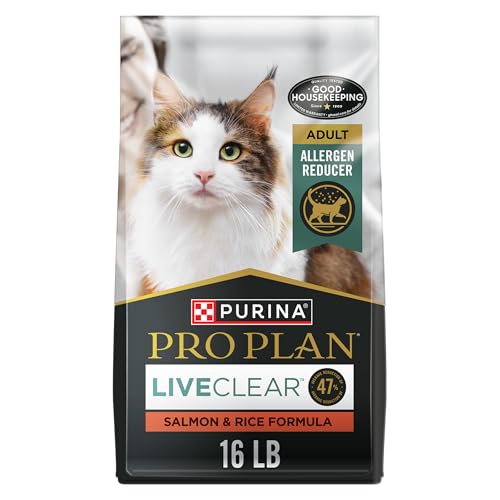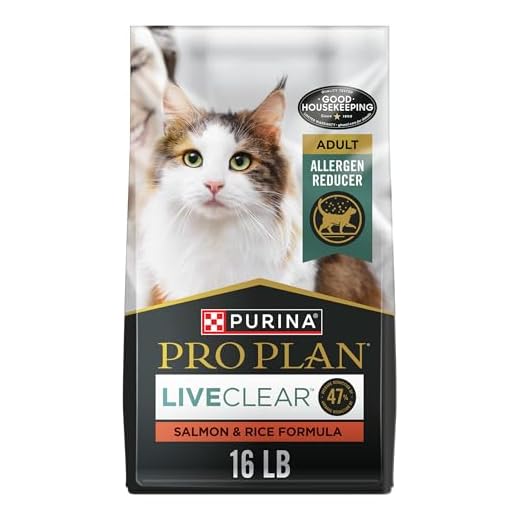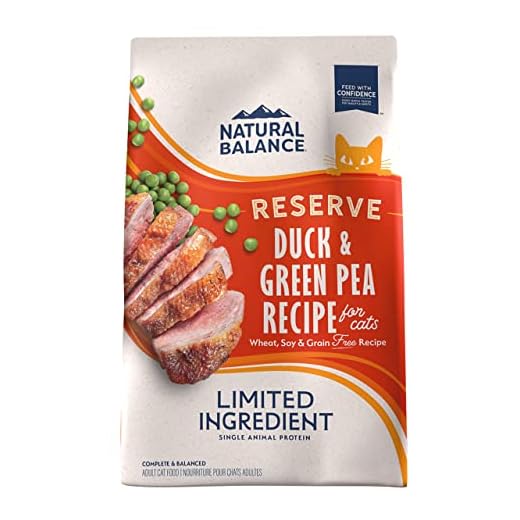
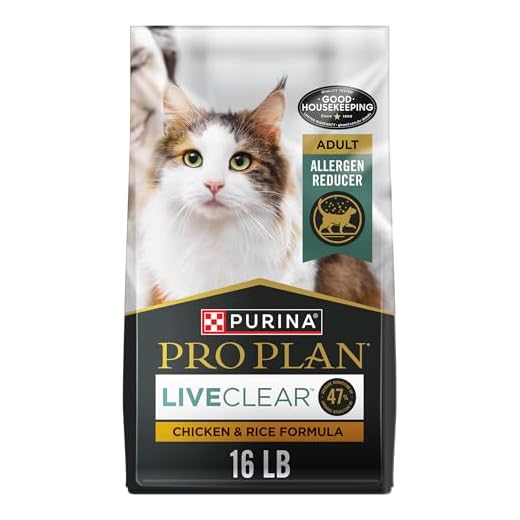


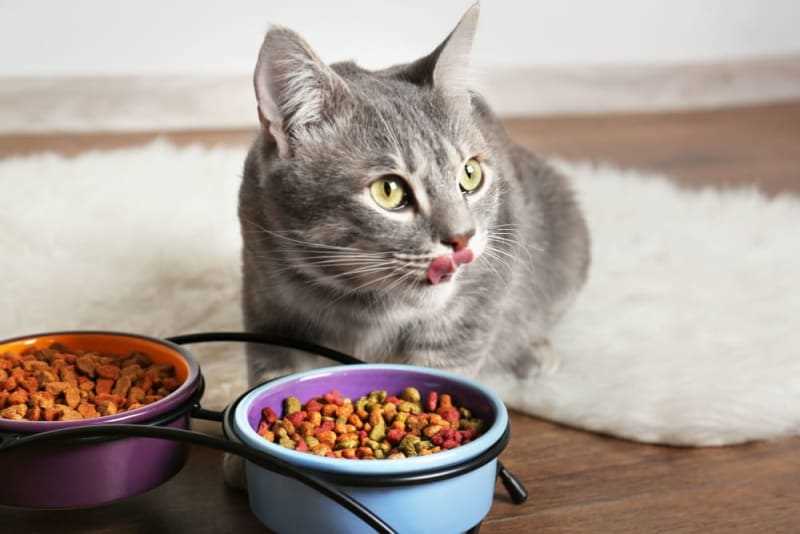
Choosing the right nourishment is critical for our four-legged companions, especially those experiencing respiratory challenges. High-quality proteins, limited carbohydrates, and specific fatty acids can significantly impact their well-being. This article provides detailed insights into the most suitable dietary options tailored to support these sensitive animals.
The content is designed for pet owners, veterinarians, and anyone interested in enhancing the quality of life for their furry friends. By understanding the nutritional needs of felines with breathing difficulties, readers can make informed choices that foster better health outcomes.
In this piece, you will find an overview of key ingredients to look for, how to read pet food labels effectively, and recommendations for both commercial and homemade meals. The goal is to empower you with knowledge that can lead to improved respiratory health and overall vitality for your beloved pet.
Optimal Nutrition for Felines with Respiratory Issues
Choosing the right diet can significantly impact the health of a pet suffering from respiratory conditions. A high-quality source of protein, such as chicken or fish, is often recommended, as it supports muscle maintenance and overall health. Additionally, it is advisable to avoid ingredients that may trigger allergies or irritate the respiratory system.
Formulas that feature limited ingredients are beneficial, as they reduce the likelihood of adverse reactions. Ingredients like grains, artificial preservatives, and fillers should be minimized, as they may exacerbate symptoms. Instead, focus on options rich in omega-3 and omega-6 fatty acids, which can help reduce inflammation in the airways.
Key Nutritional Components
- Proteins: Look for high-quality animal proteins to ensure adequate amino acids.
- Fats: Healthy fats from fish oil or flaxseed can support respiratory health.
- Carbohydrates: Choose easily digestible sources, such as sweet potatoes or peas.
- Vitamins and Minerals: Ensure the diet includes essential vitamins, particularly antioxidants like vitamin E and C.
Discussing dietary options with a veterinarian can help tailor the nutrition plan to specific needs. Regular monitoring of the pet’s condition and response to dietary changes is crucial for optimal management of respiratory health.
Understanding Asthma Triggers in Cats
Identifying triggers is essential for managing respiratory issues in felines. Common irritants include environmental factors, dietary components, and stressors that can exacerbate symptoms.
Environmental allergens, such as pollen, dust, mold, and cigarette smoke, frequently contribute to flare-ups. Keeping living spaces clean and minimizing exposure to these elements can help reduce incidents. Regular vacuuming and using air purifiers may also be beneficial.
Dietary Considerations
Some ingredients in commercial meals may provoke allergic reactions or sensitivities. Selecting hypoallergenic options can alleviate digestive distress and reduce inflammation in the respiratory tract.
Monitoring ingredient lists is crucial. Look for products with limited additives and fillers, as these can be potential culprits. It may also be advantageous to introduce novel protein sources, which can help determine any food-related triggers.
Stress Management
Stress can play a significant role in respiratory distress. Creating a calm environment, providing safe spaces, and maintaining a routine can help minimize anxiety.
- Provide vertical spaces for climbing and observing.
- Engage in interactive play to promote physical and mental stimulation.
- Use calming pheromone diffusers to create a soothing atmosphere.
Understanding and managing these triggers can greatly improve the quality of life for affected animals. Regular consultations with a veterinarian will assist in developing an effective management plan tailored to individual needs.
Key Ingredients for Feline Respiratory Health
Choosing the right components can significantly enhance respiratory well-being in furry companions. Ingredients rich in anti-inflammatory properties are particularly beneficial in supporting lung function and overall respiratory health.
Omega-3 fatty acids, found in sources such as fish oil, can help reduce inflammation in the airways. These essential fats contribute to improved lung function and can alleviate symptoms associated with respiratory issues.
Beneficial Nutrients
- Antioxidants: Ingredients like blueberries and cranberries are packed with antioxidants that combat oxidative stress, promoting lung health.
- High-quality proteins: Lean meats, such as chicken or turkey, provide the necessary amino acids for immune support and muscle maintenance.
- Fiber: Ingredients like pumpkin and sweet potatoes promote digestive health, which can indirectly support respiratory function by ensuring a balanced diet.
- Vitamins: Vitamin E and vitamin C are crucial for maintaining a strong immune system and reducing inflammation.
Incorporating these ingredients into daily meals can create a nutritious and supportive dietary plan. Monitoring your companion’s reaction to new components is essential to ensure optimal health benefits.
Recommended Commercial Cat Foods for Asthma
High-quality nutrition plays a significant role in managing respiratory conditions in felines. Products that are formulated with limited ingredients can minimize potential allergens, which is essential for maintaining respiratory health. Look for options that emphasize protein sources without fillers like grains or artificial additives.
Choosing options rich in omega-3 fatty acids can also be beneficial. These fatty acids help reduce inflammation in the airways, providing relief to those experiencing respiratory issues. Additionally, hypoallergenic formulas may be appropriate for sensitive individuals.
Key Ingredients to Consider
- High-quality protein sources: Chicken, turkey, or fish are excellent primary ingredients.
- Omega-3 fatty acids: Ingredients like fish oil or flaxseed can support respiratory health.
- Limited ingredient formulas: Fewer ingredients can help identify and avoid potential allergens.
- Grain-free options: These may reduce the risk of allergy-related symptoms.
It’s advisable to consult with a veterinarian to tailor a dietary plan that best suits an individual’s needs. Each cat’s response may vary, so monitoring their health and adjusting the diet accordingly is crucial.
Examples of Beneficial Nutritional Features
| Nutritional Feature | Benefit |
|---|---|
| High protein content | Supports muscle health and energy levels. |
| Low carbohydrate levels | May help in maintaining a healthy weight. |
| Antioxidants | Support overall immune health. |
Monitor your pet’s health closely after introducing new meals. Not all options work for every individual, so adjustments may be necessary to find the most suitable choice.
Homemade Diet Options for Asthmatic Cats
Creating a tailored meal plan at home can significantly benefit felines suffering from respiratory issues. Focus on high-quality protein sources, such as chicken, turkey, or fish, ensuring they are fresh and free from additives. Avoid grains and fillers that may trigger allergies or worsen symptoms.
Incorporating vegetables like carrots, peas, and pumpkin can add fiber and essential nutrients. Cook these ingredients thoroughly to enhance digestibility. Always introduce new items gradually to monitor for adverse reactions.
Recipe Ideas
Here are a few simple recipes to consider:
- Chicken and Pumpkin Stew: Boil chicken until fully cooked, shred it, and mix with pureed pumpkin and a small amount of water.
- Fish Medley: Steam fish and combine it with finely chopped carrots and peas for added nutrition.
- Turkey Delight: Ground turkey mixed with cooked spinach can provide essential vitamins while being easy to digest.
Always consult a veterinarian before making significant dietary changes. Regular check-ups will help ensure that the chosen meals support overall health while managing respiratory conditions effectively.
Importance of Hydration in Asthma Management
Ensuring proper fluid intake is fundamental for managing respiratory conditions in felines. Adequate hydration helps maintain mucus membrane moisture, facilitating easier breathing and reducing airway irritation. Cats often struggle with drinking sufficient water, which can exacerbate respiratory issues.
Incorporating moisture-rich options in their diet can significantly aid in hydration. This can include wet meals or adding water to dry kibble. Not only does this enhance fluid intake, but it can also improve overall health and digestion.
Benefits of Proper Hydration
Hydration plays a key role in several physiological processes:
- Mucus production: Well-hydrated cats produce optimal mucus, which acts as a protective barrier in the airways.
- Temperature regulation: Adequate fluid levels help maintain a stable body temperature, which is beneficial during respiratory distress.
- Overall health: Hydration supports the immune system, reducing the likelihood of infections that could complicate respiratory conditions.
Encouraging fluid consumption can involve various strategies:
- Provide fresh water daily in clean bowls.
- Consider using a cat water fountain to stimulate interest.
- Mix water into meals or offer broth as a treat.
Monitoring hydration levels is also important. Signs of dehydration include dry gums, lethargy, and decreased skin elasticity. If these symptoms are present, consult a veterinarian for further guidance.
Monitoring Your Cat’s Response to Dietary Changes
Track your feline’s health closely after altering their nutrition. Observing any changes can help determine the effectiveness of the new regimen. Begin by keeping a journal to note daily behaviors, breathing patterns, and any visible reactions.
Pay attention to potential symptoms such as coughing, wheezing, or changes in energy levels. These observations can indicate how well your pet is adjusting to the new diet.
Key Indicators to Monitor
- Respiratory Health: Look for improvements or worsening in breathing difficulty.
- Energy Levels: Assess if your companion seems more active or lethargic.
- Weight Changes: Monitor any significant weight loss or gain.
- Gastrointestinal Reactions: Note any vomiting, diarrhea, or changes in appetite.
- Skin and Coat Condition: Check for improvements or issues with fur quality and skin health.
Consult with a veterinarian if you notice persistent negative symptoms or if your pet’s condition does not improve. Adjusting dietary components may be necessary, along with a thorough examination to rule out any underlying health concerns.
In conclusion, careful monitoring and documentation are essential for evaluating how dietary modifications impact your pet’s health. Consistent observations will guide you and your veterinarian in making informed decisions regarding their nutritional needs.
Best food for cats with asthma
Features
| Part Number | 038100186096 |
| Model | 00038100186096 |
| Color | Other |
| Release Date | 2022-03-25T00:00:01Z |
| Size | 16 Pound (Pack of 1) |
Features
| Part Number | NB52510 |
| Model | 52510 |
| Color | Blacks & Grays |
| Size | 10 Pound (Pack of 1) |
Features
| Part Number | 038100186034 |
| Model | 00038100186034 |
| Color | Other |
| Release Date | 2022-03-25T00:00:01Z |
| Size | 16 Pound (Pack of 1) |
Features
| Part Number | 70 |
| Model | 70 |
| Warranty | If you have a question that needs immediate attention, please call (800) 919-2833. |
| Color | Brown |
| Size | 12 Pound (Pack of 1) |
Features
| Size | 7.9 Ounce (Pack of 1) |
Features
| Part Number | 9008 |
| Model | 9008 |
| Warranty | The Wellness Guarantee: If for any reason you or your cat are not satisfied with this product, return it to Amazon for a refund. |
| Color | Seafood Pate Favorites Variety Pack |
| Release Date | 2020-03-31T00:00:01Z |
| Size | 3 Ounce (Pack of 24) |
Video:
FAQ:
What are the best types of food for cats with asthma?
Cats with asthma may benefit from a diet that includes high-quality protein and limited carbohydrates. Look for foods that contain real meat as the first ingredient, such as chicken, turkey, or fish. Grain-free options can also be a good choice since grains may trigger allergic reactions. Additionally, consider foods that are enriched with omega-3 fatty acids, which can help reduce inflammation in the airways. Consulting with a veterinarian can help you select the best food tailored to your cat’s specific needs.
How can I tell if my cat’s food is aggravating its asthma?
If your cat’s asthma symptoms worsen after eating, it may be a sign that the food is irritating its condition. Look for signs like coughing, wheezing, or labored breathing shortly after meals. Additionally, if your cat shows signs of gastrointestinal distress, such as vomiting or diarrhea, this could also indicate an adverse reaction to the food. Keeping a food diary can help you track any correlations between their diet and asthma flare-ups. Always consult a veterinarian for guidance on food choices that are suitable for your cat.
Are there any specific ingredients to avoid in cat food for asthmatic cats?
Yes, certain ingredients may trigger asthma symptoms in cats. It is advisable to avoid foods that contain artificial additives, fillers, and common allergens like corn, soy, and wheat. Preservatives and artificial flavorings can also contribute to respiratory issues. Additionally, be cautious with fish-based diets, as some cats may be allergic to specific fish proteins. Always read the ingredient labels carefully and consider hypoallergenic or limited-ingredient diets if your cat has known sensitivities. Consulting a veterinarian can provide further insights into suitable dietary choices.

